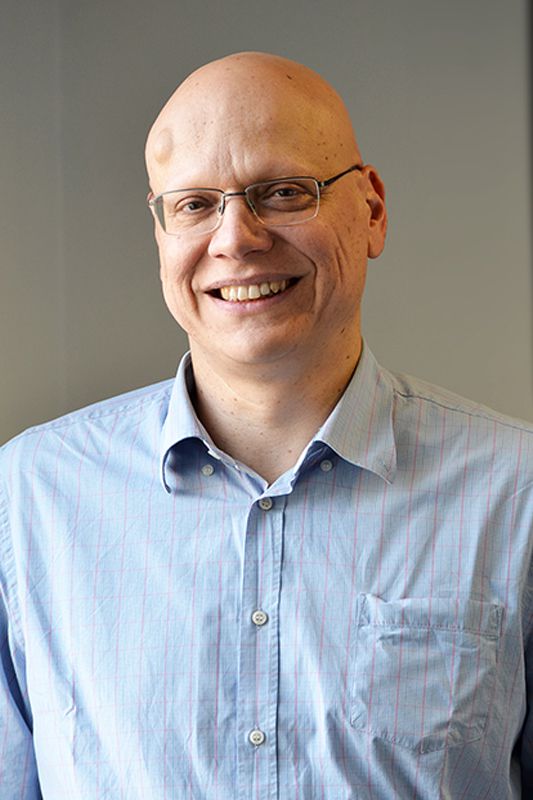In November 2018, Dr Antonio Cosma joined LIH as the new Head of the National Cytometry Platform. He replaces Dr Coralie Guerin who has been in this position for three years. With more than 15 years of experience in managing core facilities, Dr Cosma has extensive expertise in developing cytometry-based assays and data analysis.
In an interview with LIH's Communication Unit, the Italian national tells about his background, his scientific interests, the role of the core facility, his responsibilities and his vision for new developments.
Could you tell us about your educational and professional background?
I hold a PhD in Human Biology from the Ludwig Maximilian University in Munich, Germany, and a habilitation from the University Paris-Saclay in France. I have already been working in various institutions in Italy, Germany and France before arriving in Luxembourg. During my PhD, I studied a HIV vaccination strategy, with made me specialise in the field of virology and immunology.
Over time, I became highly interested in cytometry technology, especially in the aspects on single cell analysis and data handling. My last position, which I held for nine years, was at the CEA in France - the Alternative Energies and Atomic Energy Commission - where I was in charge of managing the cytometry core facility FlowCyTech.
Why are you passionate about cytometry and what challenges you in this domain?
Cytometry is a powerful transversal technology that is in continuous evolution. It is widely used in cell biology research to tackle a diverse range of research questions. The techniques are complex and require advanced skills, especially for data analysis. I am fascinated about this complexity.
Cells can be analysed for multiple physical, chemical and biological features, each sample contains millions of cells, and a big number of samples can be processed in a single experiment. Cytometry therefore generates very large, multi-dimensional data sets. I am continuously in search of new ways to improve workflows and data management. A few years ago, I had the idea that business intelligence tools, normally employed by companies to analyse business information, could be an appropriate solution to analyse cytometry data. And yes, these tools can indeed be used!
I am also passionate about mathematics and try to incorporate this knowledge into my work. As an example, I recently proposed a new method for the annotation of cell types based on prime numbers and the fundamental theorem of arithmetic.

What is the mission of the National Cytometry Platform and your role as the Head?
The
National Cytometry Platform is a shared resource facility that assists
researchers with cytometry experimental design, data acquisition, cell
sorting and data analysis. We offer state-of-the-art equipment for flow,
mass and imaging cytometry. My role is - together with my team - to
advice researchers on how to address their biological questions with
cytometry technology. If there is a new research project with cytometry
assays, I would like the team to be involved right from the project’s
onset, helping to prepare the work plan and set up protocols. I aim to
create a strong connection between the research units at LIH and the
platform. Of note, the platform is accessible to external researchers as
well. It is also planned that we extend our collaborations with other
institutions in the future.
Training is also an essential duty of
the platform. To make researchers acquainted with the principles of
cytometry and the possibilities it offers, I will regularly hold
lectures and individual training sessions. The last years, the platform
had been organising Flow Cytometry Days in partnership with cytometry
equipment manufacturers. This will be continued.
What makes the National Cytometry Platform so attractive to you?
I
started my career as a scientist and slowly moved to core facility
management. The National Cytometry Platform serves a community of
researchers trying to understand the complex relationship between human
health, the immune system and the environment. This multi-facet approach
represents for me a scientific and technological challenge.
The
close interaction with researchers creates a highly stimulating
environment. Moreover, the platform is equipped with innovative
instruments - amongst others for mass and imaging flow cytometry - that
are rarely present in the same facility. At LIH, I thus found for me a
unique occasion to professionally grow and apply my ideas to the field
of single cell technology.
What are your primary assignments?
I
mentioned business intelligence before. I aim to integrate it in
cytometry data management at LIH as I successfully did in my previous
position. The use of business intelligence can further improve the
performance and quality of services provided by the National Cytometry
Platform. Business intelligence tools help standardising workflows and
harmonising the way multidimensional data is analysed. If data is
rendered more comparable, it will become possible to use existing data
sets from one project to answer a research question from another
project.
Next to providing service to researchers as a platform, I also aim to develop my own research line focusing on enhanced analysis systems for studying the immune system. I am looking forward to bringing new technical advancements to the National Cytometry Platform.
